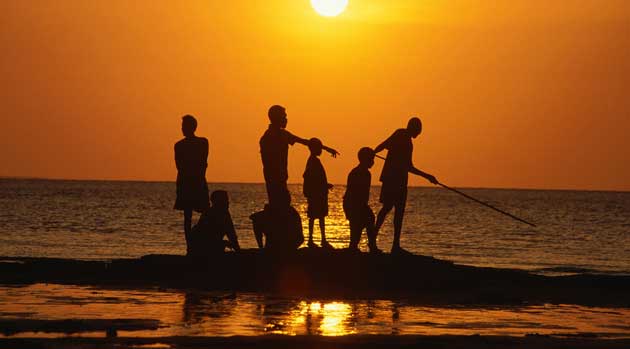Aborigines win control of sea fishing rights

Your support helps us to tell the story
From reproductive rights to climate change to Big Tech, The Independent is on the ground when the story is developing. Whether it's investigating the financials of Elon Musk's pro-Trump PAC or producing our latest documentary, 'The A Word', which shines a light on the American women fighting for reproductive rights, we know how important it is to parse out the facts from the messaging.
At such a critical moment in US history, we need reporters on the ground. Your donation allows us to keep sending journalists to speak to both sides of the story.
The Independent is trusted by Americans across the entire political spectrum. And unlike many other quality news outlets, we choose not to lock Americans out of our reporting and analysis with paywalls. We believe quality journalism should be available to everyone, paid for by those who can afford it.
Your support makes all the difference.A landmark ruling with the potential to sour relations between two of Australia's most vociferous social groupings – Aborigines and anglers – has awarded control of 7,000km (4,300 miles) of coast to indigenous communities.
The decision by theHigh Court in Canberra gives Aborigines exclusive access to tidal waters in north-east Arnhem Land, in the Northern Territory.
It in effect allows local communities to ban non-indigenous fishermen from recreational angling and commercial fishing for everything from the barramundi giant perch to mud crabs.
In the area known as the Top End of the Northern Territory – the last frontier of a macho non-indigenous tradition – few freedoms are regarded as more important than the right to fish. Some fear that the ruling could widen the gulf between white and black communities.
Until now, anyone with rod, net or line, could access Northern Territory waters, reputed to offer some of the best fishing in the world. Now traditional owners will decide how fishing is conducted along 80 per cent of the Territory's coast. Wali Wungungmurra, chairman of the Northern Land Council, which represents indigenous groups in northern Australia, said: "We are overjoyed by this decision. We have waited 30 years for our sea rights to be legally recognised."
He sought to allay fears that the ruling would have an adverse effect on the non-indigenous fishing community. "A negotiated outcome will mean traditional owners around the Northern Territory's coastline can jointly participate in the management and development of a sustainable fishing industry," he said. This would include the protection of fishing stocks as well as sacred sites, he said, rejecting suggestions that the ruling would endanger the Northern Territory's billion-dollar fishing industry: "Traditional owners have developed a constructive relationship with commercial and recreational fishing representatives over the past year." Mr Wungungmurra said he looked forward to "obtaining a win-win outcome for all Territorians" in a negotiated settlement, with anglers and commercial fishing operators accorded temporary permits for at least a year.
But the Territory's 45,000 recreational anglers, who have been offered free permits, fear the legal decision could be the thin end of the wedge.
Terry Mills, leader of the Country Liberal Party, said he would not apply for a permit. He said: "The freedoms Territorians enjoy have been challenged by this decision."
Chris Makepeace, head of the Amateur Fishermen's Association of the Northern Territory, urged the federal government in Canberra to intervene. "We are going to have to arrange some sort of settlement with indigenous interests," he said.
The High Court decision reflects previous legal rulings, including the 1992 Mabo judgment, which recognised that Aborigines enjoyed native title in Australia as result of their traditional occupation of the land.
That ruling declared irrelevant the theory of terra nullius, under which the British argued that the land belonged to noone.
The Northern Territory's Chief Minister, Paul Henderson, said if re-elected he would negotiate with traditional owners to ensure people would be allowed to fish without a permit.
Join our commenting forum
Join thought-provoking conversations, follow other Independent readers and see their replies
0Comments